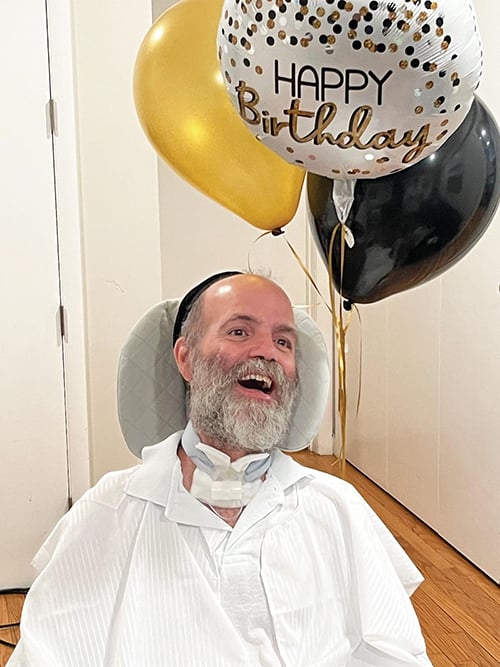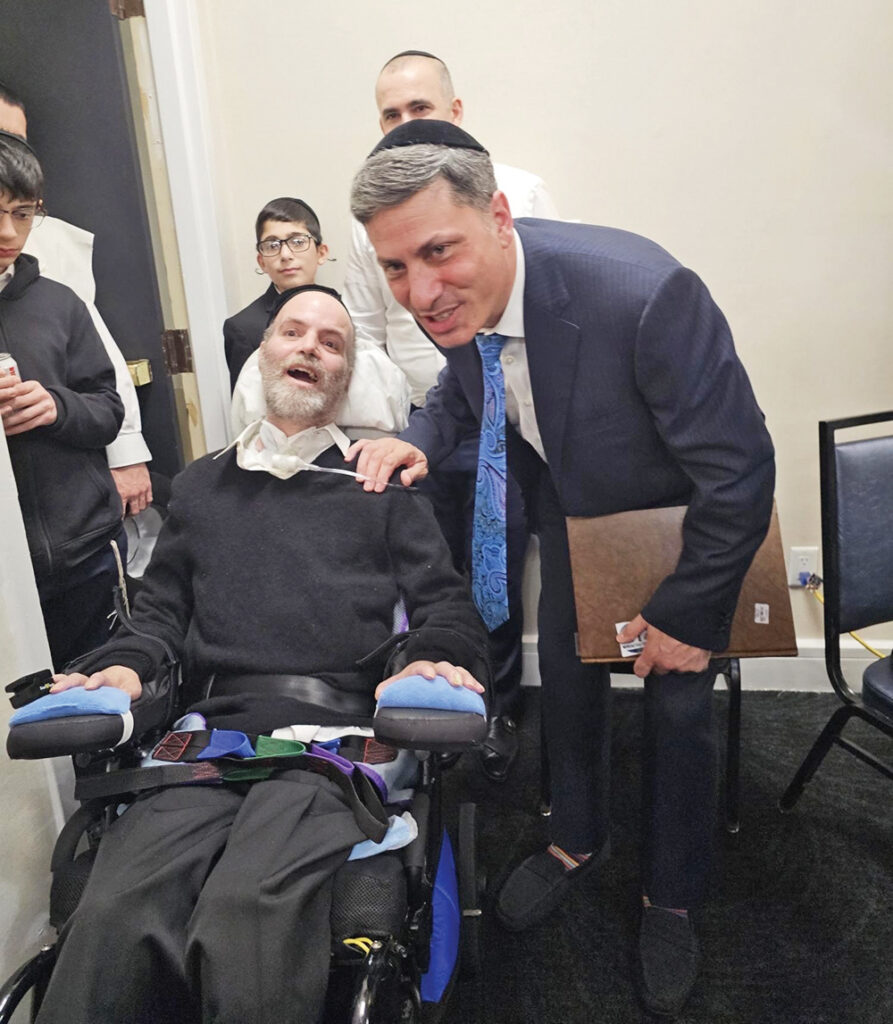
Yosef HaTzadik taught us a great lesson even as he languished in a prison in Egypt with little hope of being released. In Parshat Vayeshev (Bereishit 40:7), Yosef shows concern for his fellow prisoners, the baker and the vintner, by asking them, “Why do you look so sad today?” When they reveal that they both had experienced dreams that they could not interpret, Yosef used his heavenly spirit to help them understand the meaning of their dreams.
The lesson imparted to us by Yosef is that a Jew must find a way to put a smile on the face of another.
The Monsey friends and neighbors of Zelig Nirenberg have taken Yosef’s message to heart. Nirenberg, 59, was born in Middletown, New York. He and wife Aviva, hailing from Westfield, New Jersey, set out on a lifelong journey during which they became observant and passed down their religious lifestyle to their three children. With a background in computers, Zelig entered the expanding field of cybersecurity. In 2000, the family made aliyah, and Zelig worked with many Israeli startups in the field. Returning to the U.S. in 2013, Zelig worked for the Pentagon and even carried a “Ghost ID.” In addition to his professional expertise, Zelig spoke seven languages. His passion for Jewish learning continued throughout as he set aside five hours per day to study. Every month he sat for the Dirshu exams and scored in the 90s on all. He took a daily jog to keep his body in shape as well.
In March 2022, after Zelig began losing feeling in his limbs, the dreaded diagnosis of amyotrophic lateral sclerosis (ALS) shocked Aviva and the couple’s friends and neighbors in Airmont. For the first nine months after his diagnosis, Zelig was confined to a nursing home, but also in and out of the hospital because the nursing home was not equipped to address the various emergencies that arose. Additionally, the distance between the nursing home and Zelig’s neighborhood, and the fixed visiting hours, made it very challenging for Zelig’s friends and neighbors to schedule visits. Certainly, visiting Zelig on Shabbat was not an option. Consequently, Zelig’s health and spirits further deteriorated, and it was apparent that a better solution was needed to reverse the downward spiral.
In January 2023, Zelig returned home where Aviva, with the help of caring neighbors, set up a virtual hospital for him. During the summer of 2023, in response to a study comparing the symptoms of Lyme disease to those of ALS, Zelig was tested for the infection, and the results came back positive for several tick-borne infections. Zelig began being treated with massive doses of antibiotics against Lyme and other tick-borne infections. To the great delight of his caretakers, Zelig reacted with increased movement in his hands and legs. Unfortunately, this past Rosh Hashanah he experienced an allergic reaction to the antibiotics and since being weaned off them has reverted somewhat to his previous condition. After working with an allergist to determine the drug allergy, the Lyme treatment will be resumed and the family is hopeful for a full recovery.

Aviva is a life coach by profession, specializing in working with college students and adults with ADHD. Her husband’s illness has turned her life into the daily challenge of running a 24/7 hospital facility in her home, juggling huge medical expenses and keeping her husband’s spirits positive. Despite all she is coping with, Aviva has managed to see the blessings that have enabled her to get through. Even before her husband’s illness, she began keeping a “gratitude notebook” in which she lists all of the blessings she has been accorded. She feels blessed that she and her husband bought their Monsey home just in time and were able to renovate the first floor into a fully equipped virtual medical facility. She is grateful to Hashem that she was able to celebrate the weddings of a son and daughter during COVID and that she and Zelig are now the proud grandparents of two granddaughters. She feels blessed to have joined a group of women, themselves coping with illness in their families, who give strength to each other and help firm up each other’s emunah. These women are her local “family” as her children are in Israel, Baltimore and San Diego, and she doesn’t have any local relatives.
What is clear to the family, dear friends and community is that Zelig must be cared for in his home. Rabbi Chaim Schabbes, rav of Knesset Yisroel and a renowned Monsey posek, has ruled that it is a matter of pikuach nefesh to keep Zelig at home, as sending him back to a nursing facility would be a certain death sentence. When one speaks with Zelig’s neighbors it becomes readily apparent that this is no exaggeration.
Rabbi Joshua Fruchter, a lawyer by profession, was a former neighbor of the Nirenbergs. Now that they have moved to a different area in Airmont, his walk to their home on Shabbat afternoons takes 20 minutes. But the reward is being able to read the Haftorah, share divrei Torah with Zelig and sing zemirot for seuda shlishit, which always brings a smile to his chaver’s face. To ensure that these Shabbat visits continue, Fruchter coordinated ad campaigns in various Monsey publications, and now for the next 12 weeks in The Jewish Link, with the Rockland Chesed Network, to help the Nirenbergs raise funds to cover the uninsured medical costs to care for Zelig at home, which total thousands of dollars per month.
Fruchter also noted that helping Zelig be cared for at home has enabled a weekly Kabbalat Shabbat minyan in Zelig’s home, organized by his neighbors. On Simchat Torah, Zelig was taken by wheelchair to the local Chabad shul to experience the spirited singing and dancing. None of this would be possible if he was in a nursing home.
Shloimie Markstein lives close to the Nirenbergs and is “like a brother” to Zelig and Aviva. He and Zelig shared office space for several years during which time Markstein got to know and appreciate Zelig’s menschlichkeit, intellect and love of learning. In addition to running his own business, Markstein has taken upon himself the running of the Nirenberg household, through overseeing nursing staff, ordering supplies and medications, scheduling therapies, and often running over in response to emergencies in the middle of the night. He has a camera installed in his home so that he can be available for all contingencies. Markstein confirms the huge financial burden on the family of keeping Zelig at home and is putting in extraordinary effort to help in any way that he can.
Daughter Elisheva, studying nursing in Netanya, Israel, shared her poignant message to the community:
“Since my father’s illness, our lives have been profoundly changed in ways we never could have anticipated. Living in Israel, we’ve always felt the unique challenge of being so far away from family in the U.S. But the distance grew even more difficult as my father’s health declined. My parents have not been able to visit us in Israel due to his condition, and we could hardly afford the expensive flights to the U.S. And yet, during the most challenging times, we’ve experienced the most incredible kindness from the people around us. Starting with Pesach 2022, which was just a few months after my father’s health began to decline, we’ve been able to visit my parents six times! The first trip was especially emotional, as it was just a month before I gave birth to our first child and I had just completed a demanding stretch of nursing school. Each subsequent trip has been made possible once again thanks to the efforts of generous, selfless individuals.
“Our most recent trip was nothing short of miraculous as it came on the heels of the Iranian attack on Israel.

“Through it all, my mother has been the anchor of our family. Her emunah and bitachon in Hashem are what give strength to my father and all of us. She reminds us to see the blessings within the challenges. It is her unwavering faith that helps us all find hope and comfort, no matter how uncertain the situation.
“It is truly humbling to witness how, in the midst of serious challenges, Hashem sends special people to help and remind us that we are never truly alone. My family and I are deeply grateful to everyone who has stood by us and continues to do so. We continue to daven for our father and all of those in need of a refuah!”
Friends and neighbors of the Nirenbergs are reaching out to the community to help them in providing sufficient monthly funds to cover uninsured costs so that Zelig can remain in his home, where he can receive the highest level of medical care and the devoted attention of his wife and neighbors, and thus the most hopeful scenario for a reversal of his symptoms.
To make a tax-deductible contribution through Rockland Chesed Network visit www.keepzelighome.org or email [email protected]. Further details appear in the full-page ad in the current issue of The Jewish Link. Tizku l’mitzvot.











